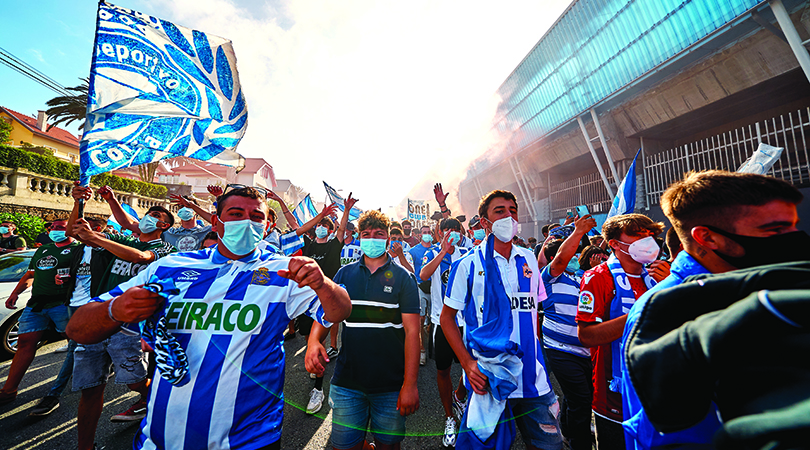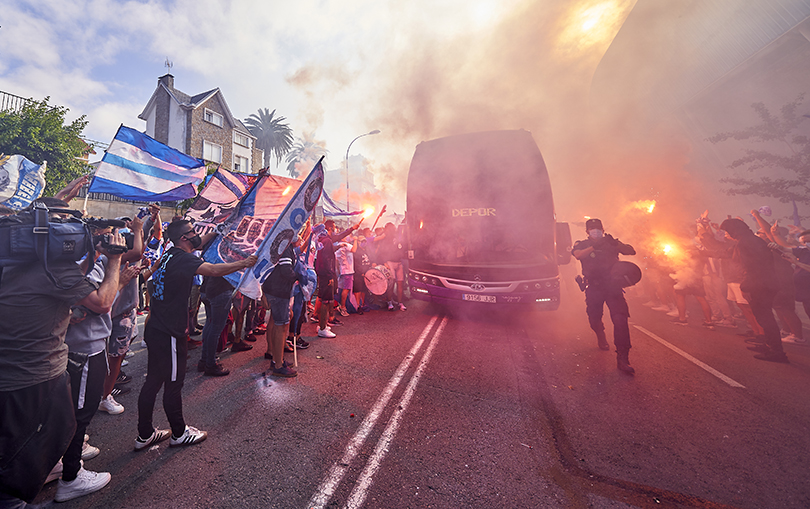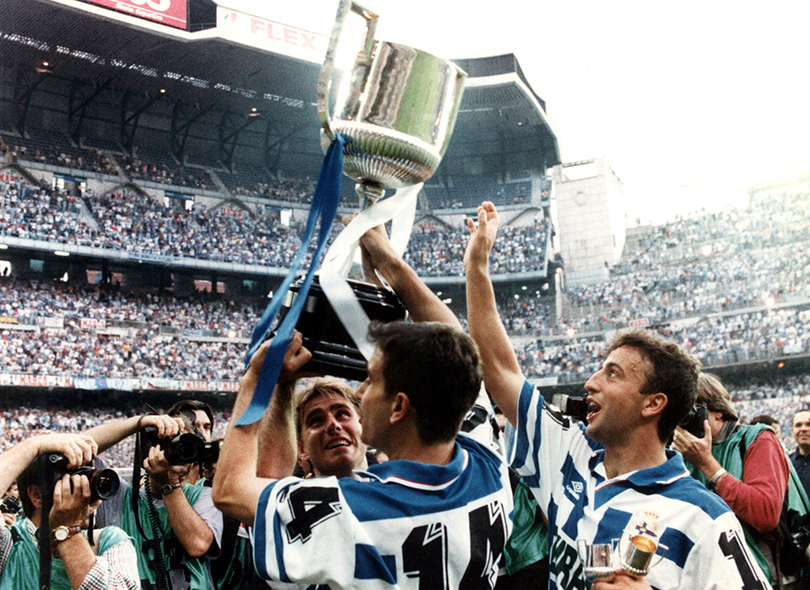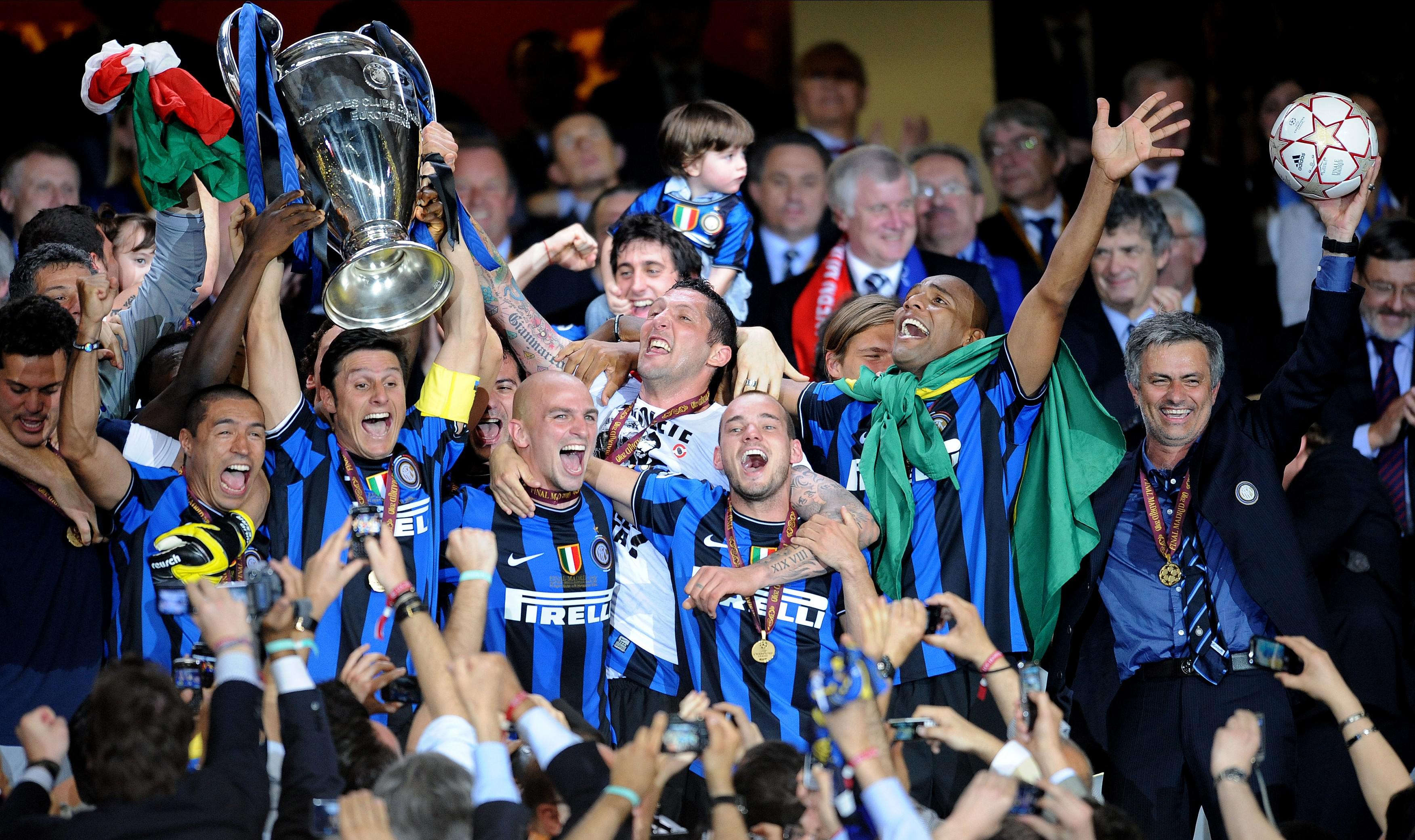Deportivo La Coruna in crisis: why the 2004 Champions League semi-finalists are at risk of relegation to Spain's fifth tier
In 2000, Deportivo became Spanish champions – now, they’re languishing in the third tier for the first time since 1981. How on Earth did things get so bad? FFT goes in search of answers

This story originally appeared in the January 2021 issue of FourFourTwo magazine – subscribe today and save 37%. All the exclusive interviews, long reads, quizzes and more but with more than a third-off normal price.
Since publication, however, their situation has worsened: Deportivo are currently fifth of 10 teams in their regionalised Segunda B group – behind even Celta Vigo B, their Galician rivals' reserves.
Reforms to Spain's league system below the second tier could spell even more danger, however. Finish between sixth and 10th, and Depor will face another round of matches to determine their fate for 2021-22 – which could effectively demote them two divisions in the worst-case scenario. It's highly convoluted, and an explanation is offered here.
For now, though, this is how they ended up in their current mess. It's been quite the fall...
Maria Pita defines what it is to be from A Coruna. On May 4, 1589, she watched her husband – an army captain defending the old city walls from Francis Drake’s English Armada – die from a crossbow to the head. Not only did she not flinch, Pita fought for her besieged Galician city. She picked up a spear and launched it at the English flag bearer, killing him.
“Quen tena honra, que me siga!” she screamed to her captivated troops – in local language Gallego, not Spanish – from A Coruna’s highest rampart. “Whoever has honour, follow me!” Pita’s forces then repelled the English with the same fierce determination Drake & Co. had exhibited in the English Channel a year previously.
Just over 400 years later, on May 20, 2000, nearly half of the city’s 245,000 population gathered in the square that bears Pita’s name, statue and battle cry to celebrate A Coruna’s most significant event in the interceding four centuries – Deportivo becoming just the ninth team in history to win La Liga.
Get FourFourTwo Newsletter
The best features, fun and footballing quizzes, straight to your inbox every week.
A small club on Spain’s north-western tip, Depor were the embodiment of their war hero’s underdog spirit, bravery and will to win. Yet, as a dynasty beckoned, an economic catastrophe meant ‘Super Depor’ became little more than a yo-yo club between La Liga and the Segunda.
This summer, things got worse. In July, 20 years after winning Spanish football’s top prize, Deportivo were relegated to the regional Segunda B – the 102-team third tier which is more of a graveyard than a football league – without even playing the last game of a chastening season.
How did it come to this?

Depor were dying when Augusto Cesar Lendoiro became president in June 1988. A lawyer-turned-politician who had made the city’s roller hockey club Liceo national champions in five years, Lendoiro needed quick cash to keep the club afloat. So, he enlisted retired midfielder Manolete – by then the director of a local bank – to push through a series of loans to pay players and service some of the debt.
Never one to do things by halves – think ex-Atletico Madrid owner Jesus Gil, only slightly less unhinged – Lendoiro doubled down on his investment. In 1991, under the progressive instruction of local coach Arsenio Iglesias, Deportivo secured their return to La Liga.
“They took risks, but they paid off,” Luis de la Cruz, a Deportivo supporter and AS journalist who has been covering the club for 25 years, explains to FourFourTwo. “All of a sudden, you’ve got the cleverest kid in the class doing something that no one else can do.”
Lendoiro added the stardust, using his cult of personality to convince Brazilian trio Mauro Silva, Bebeto and Donato – two of which would start the 1994 World Cup Final – that the Galician climate (one of Spain’s wettest) was akin to the Copacabana at the height of summer.
Three years after winning promotion back to the top flight, Deportivo were a last-minute missed Miroslav Djukic spot-kick away from a maiden title. Regular penalty taker Donato had been substituted against Valencia and Bebeto refused to step up, leaving their visibly terrified centre-back to hand Johan Cruyff’s Barcelona the league instead. It was, says De la Cruz, “the worst thing you could imagine having to deal with”.
Revenge over Valencia came in the 1995 Copa del Rey Final. Played over two separate days (four days apart) at the Bernabeu after torrential rain interrupted the first game with 11 minutes remaining, midfielder Alfredo’s header sealed the prize upon its resumption. This was a team which fought for each other; an outlier on Spain’s fringes.
“The atmosphere within Depor was always incredible – it was just like a family,” one-club man Fran, who went on to make more than 600 appearances, tells FFT. “We experienced an amazing period with magnificent results and achievements that nobody expected.”
It was under Basque coach Javier Irureta from 1998, however, that Depor played with the percussive urgency befitting the ‘Super’ epithet. A man of the north, having reached UEFA Cup and Copa del Rey finals as a player for Athletic Bilbao, Irureta embraced Galician culture. He once walked the 500-mile Camino de Santiago pilgrimage from southern France across northern Spain to the cathedral in Santiago de Compostela.
By the final day of 1999-00, Deportivo were again battling for top spot, with playmaking genius Djalminha and centre-forward killer Roy Makaay the latest foreign recruits lured to the Riazor by president Lendoiro’s millions. Beat Espanyol and they would be champions; lose, and Barça could pip them. Again.
“We were that convinced we’d win,” insists Fran. “Djukic and the penalty had damaged the club, but it was so important to lay those ghosts to rest.”
When Donato opened the scoring after just three minutes, victory was all but assured. The celebrations went on long into the night. “I’d never seen anything like it,” recalls Fran, as bars overflowed with people. “Everyone was out on the streets – we tried to take the team coach to the Cuatro Caminos fountain where most supporters congregated, but we couldn’t get anywhere near it.”
Partying in the Plaza Maria Pita came a day later – a city drunk on football. The players – sporting bleached-blond hair – slurred their words on the town hall’s balcony. Lendoiro struggled to even stand.
“I’d only just turned 18, so you can imagine what I did for several days!” Victor Losada, a lifelong Deportivo fan who went to his first match in 1991 and runs the riazor.org blog, reveals to FFT. “This was a victory for the city, not just its football team.”
Juan Carlos Valeron came in from Atletico that summer and the success kept coming: Depor beat Real Madrid’s Galacticos of Raul, Roberto Carlos, Luis Figo and Zinedine Zidane at the Bernabeu to lift the 2002 Copa del Rey, not just in their opponents’ back yard, but on the occasion of their 100th birthday. It was later dubbed El Centenariazo, and Deportivo fans sang Happy Birthday at full-time.
“That’s the game I look back on differently to any other,” says captain Fran. “I genuinely don’t think any other side could have done what we did that day.”
The Branquiazuis were no less triumphant on the continent, reaching the latter stages of the Champions League for four campaigns running. The one match every Deportivista remembers is 2003-04’s quarter-final second leg at home to Milan, having lost 4-1 at San Siro. Not only did Depor win, they won 4-0 against defending champions who would go on to feature in two of the next three finals.
“That game is about more than just the comeback,” says Fran, who scored the fourth goal that night. “You’ve got Cafu, Dida, Pirlo, Maldini, Shevchenko, Kaka. This is one of the all-time great teams we beat – incredible.”
That Milan win was the beginning of the end, though. Within a year, Irureta was gone, Mauro Silva and Fran retired, and Djalminha joined Makaay in departing for pastures new. Valeron remained, but by 2007 Albert Luque, Diego Tristan, Jorge Andrade, Lionel Scaloni and Victor had also moved on, replaced by youngsters who – while accomplished, like Riki, Filipe Luis and Andres Guardado – were too raw to bring Champions League football.
“It was obvious from the outside that there were serious financial problems within the club,” admits AS journalist De la Cruz. “It was a slow death.” Fran adds, “You think the glory is going to last forever – the problem comes when you can’t maintain that.”
President Lendoiro had bet the family silver on elite continental competition each season. Without the Champions League’s television money, Depor were haemorrhaging millions every year. It didn’t exactly help that Lendoiro had enshrined his €400,000 salary into the club’s constitution in 1999.
And so, Deportivo floundered. Relegated in 2011 and again in 2013, they were in deep trouble despite bouncing straight back with promotion both times. Following that second demotion, Lendoiro’s creditors finally caught up with him – notably, the Spanish treasury. Depor’s debts were €160 million, making for Spanish football’s biggest insolvency hearing. The only way that the administrators would countenance the club’s continued existence was if Lendoiro resigned, which eventually happened on Christmas Eve 2013.
The Lendorio era was laid bare. “The real causes of Depor’s insolvency lie in the fact of having maintained a mode of management disconnected from reality,” read the report, which lambasted a “reckless and misguided business model” at the Riazor.
“If Lendoiro is the artifice of the success, he’s also the principal person responsible for the economic fall,” says De la Cruz. “Little by little, year by year, you keep losing something until you’re left with nothing.”
The new president, Tino Fernandez, paid off the €45m owed to the government through a mixture of investments and bank loans, which restored Depor’s standing off the pitch. In five years he halved the club’s debts, but struggled to win over a sceptical fanbase that grew increasingly frustrated at the constant hiring and firing of managers. He employed nine coaches in half a decade, including three (ex-West Bromwich Albion gaffer Pepe Mel, Cristobal Parralo and former Milan midfielder Clarence Seedorf) in 2017-18 alone, which ended in relegation from a top flight they are yet to return to.
“There has been a stream of presidents, sporting directors and coaches with different ideas,” says Losada. “You need patience. We haven’t committed to a project. Plenty start off and then never go anywhere, or we move on to the next one.”
Fernandez was voted out in May 2019, but replacement Francisco Zas lasted a matter of months. Present incumbent Fernando Vidal took over in mid-January. Vidal has allowed the bank Abanca to assume further control of the club, swapping debt for shares which now amount to 78 per cent.
In their annus horribilis of 2019-20, Depor won just 12 points from their first 20 games. Another relegation, to the third-tier Segunda B, seemed a near-certainty despite their late revival under Fernando Vazquez – a former English teacher now in his second spell at the Riazor – from January.
On the final day of the season, they had to beat play-off-chasing Fuenlabrada and hope results went their way to survive – but when several opposition players tested positive for COVID-19, La Liga postponed the game while allowing the rest of the matchday to start. In Depor’s absence, relegation rivals Lugo and Albacete both secured victories, condemning the Galicians to the drop.
“It brings the legitimacy of the competition into question if you’re going to suspend only one game,” laments Fran. “I still can’t believe what happened.”
The club pursued a fruitless legal challenge – a defeat made all the more exasperating when Fuenlabrada were represented in court by lawyer-turned-club secretary Javier Tebas Jnr, the son of La Liga president Javier Snr.
“I don’t want to start with the whole Tebas situation, but it’s quite clear there’s a huge conflict of interest,” states fan Losada. “You won’t find anyone connected with Deportivo who says we didn’t have an awful campaign and deserved to go down, but the least we merited was to play all the final matches at the same time.”
Two days before the rearranged clash three weeks later, Depor captain Alex Bergantinos was arrested after police received a recording of the midfielder apparently suggesting the team might not try in their upcoming fixture. They needn’t have worried: a fired-up Depor won 2-1, denying Fuenlabrada a play-off spot.
Another case is going through the Galician courts to decide whether Bergantinos’ arrest was lawful, given it was based on an ‘offence’ that hadn’t even happened.
“The only good thing to come out of this is that fans have woken up and united against the authorities,” insists AS scribe De la Cruz. Indeed, a new branch of Deportivo’s official supporters’ club called ‘Tebas Vete Ya’ (Tebas Go Now) has sprung up above English subtitle Love Football, Hate Tebas.

If there’s a positive for Depor’s first season in the third tier since 1980, this is it. Despite the pandemic, the club have flogged a league record 20,000 season tickets – a figure most La Liga clubs would struggle to match.
Fans are even permitted inside the Riazor as Segunda B doesn’t count as ‘elite sport’ in Spain, with 3,000 (10 per cent capacity) able to savour an opening-day 2-1 victory against Salamanca. It was the first of three wins and a draw from Depor’s first four league games.
The feelgood factor has been strengthened further by the return of club legends Valeron and Fran as B team manager and academy head respectively. Fran himself is delighted.
“This is the most delicate moment in this great club’s history, which is why we wanted to help,” he tells FFT. “We wouldn’t have done it if we didn’t think we could get the club back to where it belongs. What we must do is get back to Segunda A as soon as possible, then stabilise. Step by step, that’s the only way.”
Promotion won’t be easy – with Spanish football halfway through a restructure, there will be 102 teams in the regional Segunda B this season, competing in 10 groups and 20 sub-groups. Three phases and a final play-off will determine the four promotion berths.
“It’s hard to imagine what will happen if Depor don’t go up,” says De la Cruz. “There’ll need to be a big investment from someone to survive another campaign at this level, and the bank, who have already invested €30m in capital this season, is unlikely to make it.”
Deportivo, their memories of that title 20 years ago turning ever more sepia, now face a do-or-die moment.
“Honestly, those golden years were worth it,” says Losada, beaming with pride at what his club achieved. “Sure, we’re suffering now, but I hope we can see those days again. We didn’t know then what we had in front of us, and you don’t appreciate what you’ve got. I’ll remember what Segunda B feels like forever.”
While you’re here, subscribe to FourFourTwo today and save 37%. All the exclusive interviews, long reads, quizzes and more but with more than a third-off normal price.
NOW READ
FEATURE Liverpool's ‘win-win’ transfer solution: 5 takeaways from their late window signings
FANS' VIEW FourFourTwo readers share their most brilliantly mundane footballer encounters
QUIZ! Can you name the last 100 managers to win these trophies?
Andrew Murray is a freelance journalist, who regularly contributes to both the FourFourTwo magazine and website. Formerly a senior staff writer at FFT and a fluent Spanish speaker, he has interviewed major names such as Virgil van Dijk, Mohamed Salah, Sergio Aguero and Xavi. He was also named PPA New Consumer Journalist of the Year 2015.
